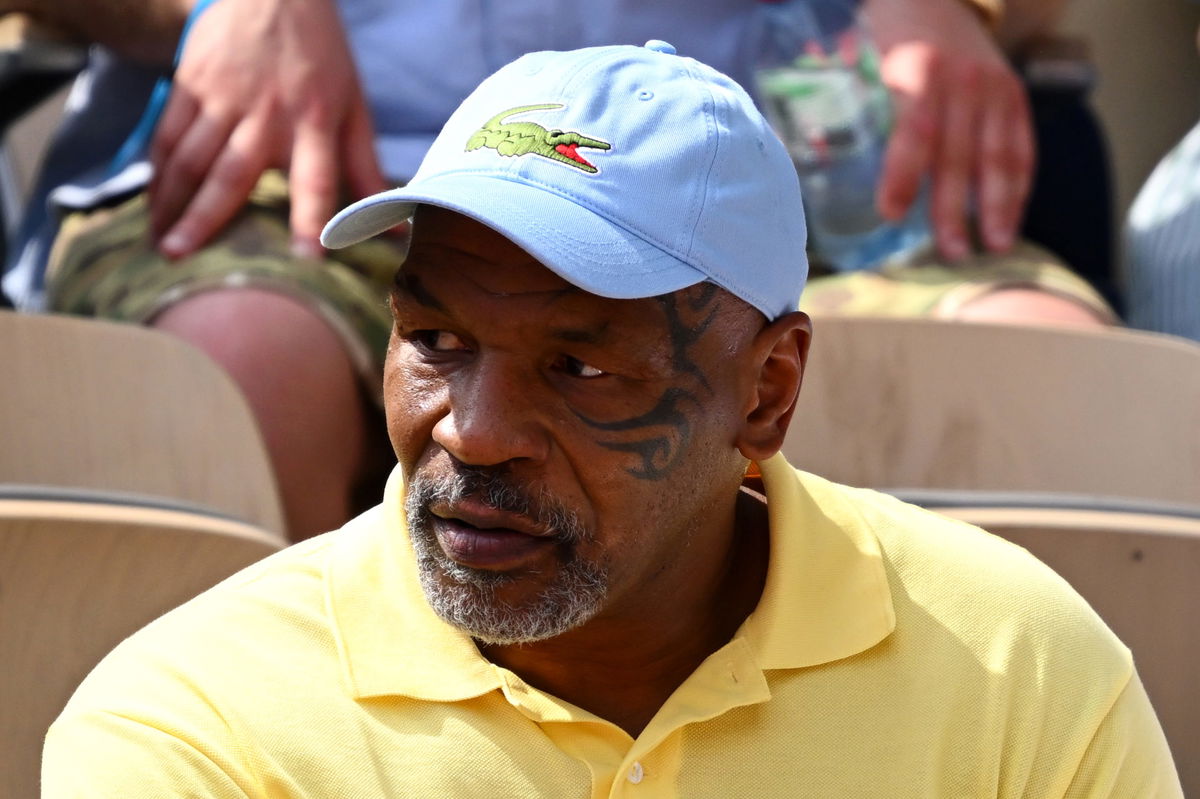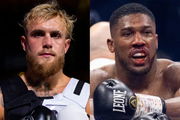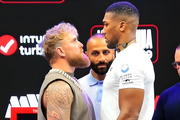
Getty
PARIS, FRANCE – JUNE 09: Mike Tyson watches on during the Men’s Singles Semi Final match between Carlos Alcaraz of Spain and Novak Djokovic of Serbia on Day Thirteen of the 2023 French Open at Roland Garros on June 09, 2023 in Paris, France. (Photo by Clive Mason/Getty Images)

Getty
PARIS, FRANCE – JUNE 09: Mike Tyson watches on during the Men’s Singles Semi Final match between Carlos Alcaraz of Spain and Novak Djokovic of Serbia on Day Thirteen of the 2023 French Open at Roland Garros on June 09, 2023 in Paris, France. (Photo by Clive Mason/Getty Images)
Mike Tyson isn’t known for mincing words. This holds true even when discussing a topic that might surprise some fans: the treatment of Olympic athletes in the United States. Tyson’s recent podcast, ‘Hotboxin with Mike Tyson,’ featured an interview with Antonio Tarver, a former light-heavyweight champion with a fascinating story.
Watch What’s Trending Now!
Tarver, a bronze medalist at the 1996 Olympics, achieved success in the professional ranks, but his journey wasn’t without hurdles. Why did Tarver, draped in the “Stars and Stripes,” feel abandoned?
ADVERTISEMENT
America vs. Europe: The disparity in celebrating Olympians?
Before touching upon the heart of their discussion, Antonio Tarver shared insights into his challenging journey post-Olympics. He recounted the controversial loss to Vassiliy Jirov from Kazakhstan, that still shadows his amateur career and highlighted the struggles he faced transitioning into professional boxing—a world where he found himself without a promoter or manager. This backdrop sets the stage for a deeper conversation about systemic neglect.
ADVERTISEMENT
Transitioning seamlessly into the crux of their dialogue, Tarver expressed, “I started with a chip on my shoulder because one you know months before that I’m walking on that track with the Dream Team. I’m wearing the stars and stripes and when you turn pro the politics you think is supposed to give you at least a fair chance at it. I never had a fair chance at it from the gate, you feel me? I never had a fair chance at it and that hurt me man when I wore the Stars and Stripes. I felt like I was a part of something but when I didn’t get no support turning pro, you feel me? In America bronze medal broke history everything.”
ADVERTISEMENT
Top Stories
MVP Chief Issues Injury Update on Jake Paul After Sparring Incident Ahead of Anthony Joshua Fight

Fact Check: Is Boxing Legend Thomas ‘Tommy Hitman’ Hearns Missing?

Meet Christy Martin’s Wife Lisa Holewyne – Is She Also a Boxer? All About the Boxing Legend’s Personal Life

Badou Jack vs. Norair Mikaeljan Stats & Prediction: Record, Age, Weight, Height, Reach, Rankings, and Knockout Ratio

Jake Paul–Anthony Joshua Fight Questioned After Former WBC Champ Drops ‘Scripted’ Bombshell

Mike Tyson, ever the empathetic listener, added his perspective, painting a broader picture of the issue. “We’re the only country that do that. If you from another European country they will worship you, give you a job and everything. America only I eat that young,” he remarked, pinpointing a stark difference in how athletes are revered and supported abroad compared to the United States.
In the same podcast Mike talked about the politics in boxing.
ADVERTISEMENT
Mike Tyson sees boxing politics as a career-long shadow
Mike Tyson, in a moment of candid reflection, revisited a pivotal bout from his prime—his unexpected defeat against Buster Douglas. Despite entering the ring confident, Tyson acknowledged a critical oversight during the match: “Even though I was cocky, the referee gave Douglas extra time to recover,” he revealed, suggesting a manipulation of the odds against him.
As the conversation with Antonio Tarver deepened on the podcast, Tyson unveiled the undercurrents of boxing politics. “If they don’t like you… you [have] beef with them too,” he stated, pointing to the entrenched bias within the sport. Tyson’s insights not only underscore the adversities he faced but also highlight the broader challenges within professional boxing’s governance.
ADVERTISEMENT
How many more hidden stories of struggle and manipulation lie beneath the surface of professional sports?
ADVERTISEMENT
ADVERTISEMENT
ADVERTISEMENT

